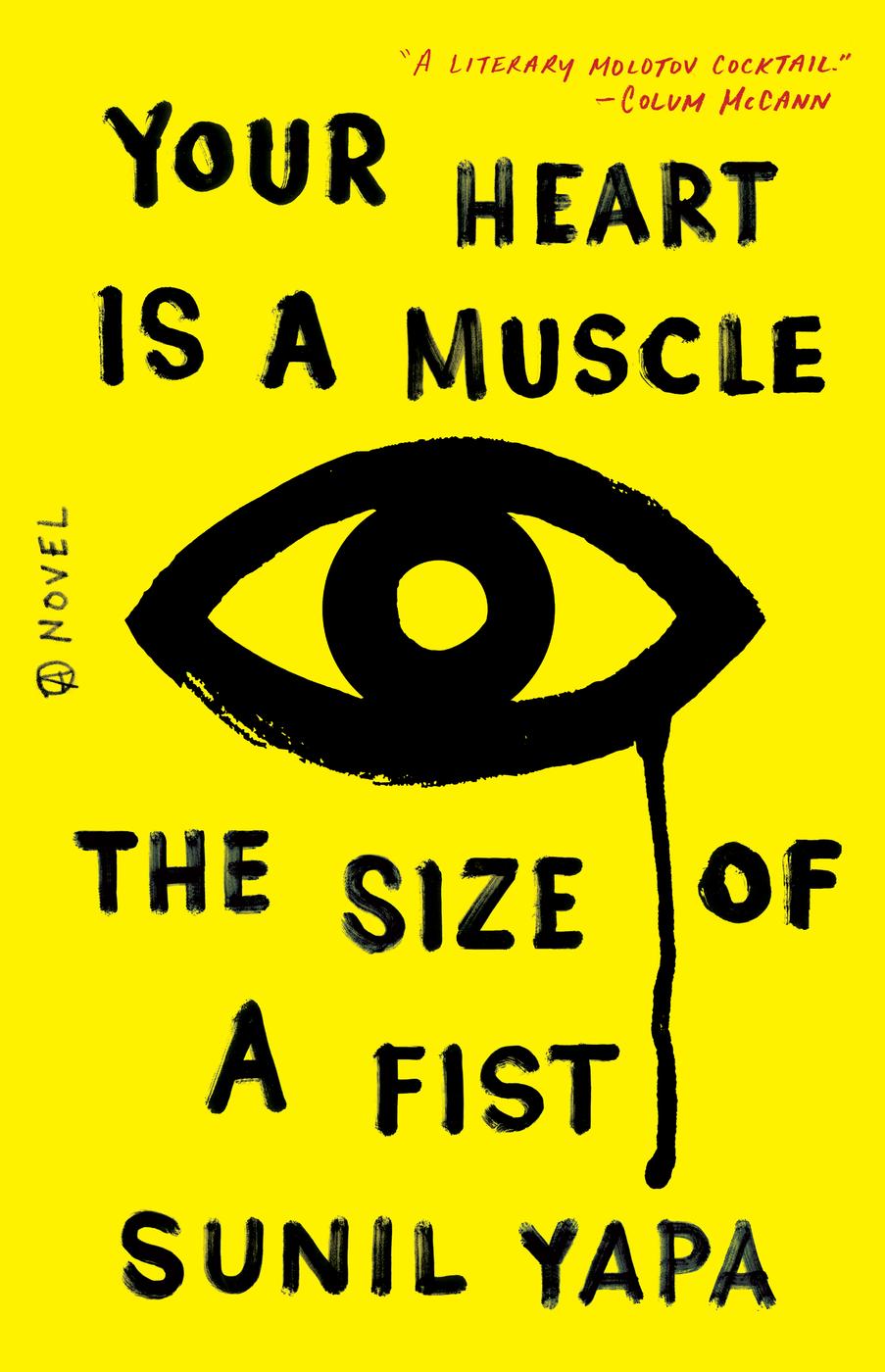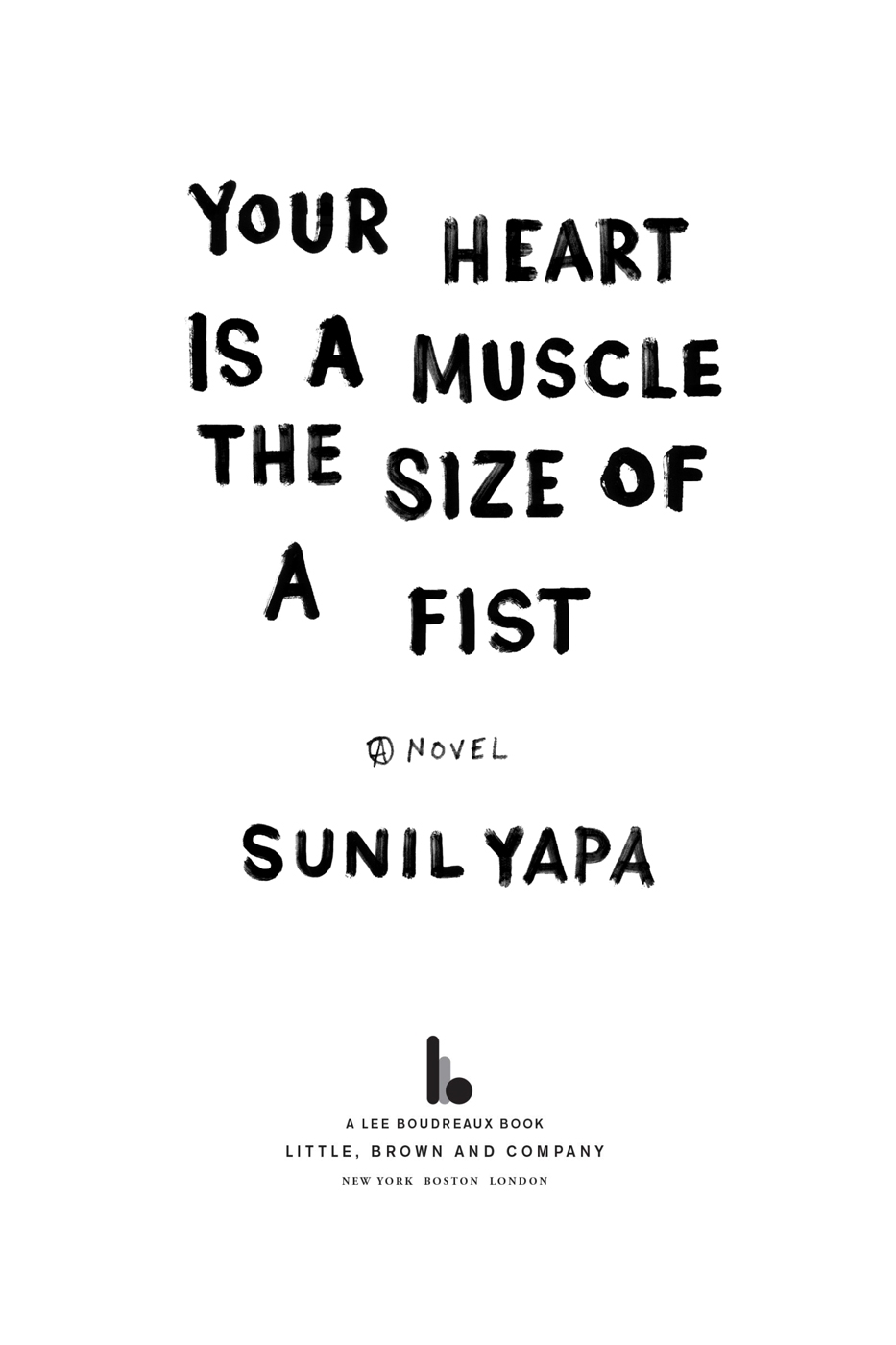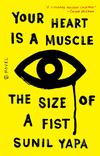Your Heart Is a Muscle the Size of a Fist
Read Your Heart Is a Muscle the Size of a Fist Online
Authors: Sunil Yapa




In accordance with the U.S. Copyright Act of 1976, the scanning, uploading, and electronic sharing of any part of this book without the permission of the publisher constitute unlawful piracy and theft of the author's intellectual property. If you would like to use material from the book (other than for review purposes), prior written permission must be obtained by contacting the publisher at [email protected]. Thank you for your support of the author's rights.
For my parents:
My father, who taught me how to see the world;
My mother, who showed me how one might love it
The match
struck and sputtered. Victor tried again. He put match head to phosphate strip with the gentle pressure of one long finger and the thing sparked and caught and for the briefest of moments he held a yellow flame. Victorâcurled into himself like a question mark, a joint hanging from his mouth; Victor with his hair natural in two thick braids, a red bandanna folded and knotted to hold them back; Victorâwith his dark eyes and his thin shoulders and his
cafecito con leche
skin, wearing a pair of classic Air Jordans, the leather so white it glowedâimagine him how you will because he hardly knew how to see himself. He was nineteen years old and should have felt as sweet as a bluebird in the dew, but in the awful damp of the early morning, after another night of sleeping on cold concreteâor not sleepingâhe moved like an old man, grumbling like the world was out to get him, had in fact perhaps already gotten him, struck him down without mercy or care or intent as if it hadn't even seen him standing there, he had just been in the way.
He knelt and made a cup of his two brown hands. Look at him bowing his head to this fragile light, joint pinched between his lips, wearing a puffy down jacket, olive green and so ragged he might have found it abandoned on the beach. Listen to the quiet rhythm of his breath. This is his morning ritual, the closest this boy comes to prayer. Skinny Victor, who believed in his heart of hearts that most everything was bullshit, for three years he had tramped the world and still he had no idea just how it worked, how people managed daily life on this blue-green planet of slums and smog, the easy knife, the lazy blade.
The traffic on the freeway thundered over his head, the sound of the big trucks hitting the joints of the highway a muted clacking like a pair of spoons. Beyond the cave of the underpass, beyond the water and the warehouses, out in the city where the streets climbed from the docks to the downtown core, the sound of the chanting crowd was a distant buzzingâfifty thousand desperate flies knocking against fifty thousand closed windows. Victor had heard talk of it for weeks. At the shelter. Bumming smokes from the tourists on the pier. At the coffee shop nursing a tea and swiping scraps from the empty plates. And now, here they were, thousands in the streets and the way their voices rose and fell, sliding down the hill, ringing off the renovated lofts, the brick apartments, the cars parked nose to tail along the oil-black streetâit was like an alarm bell sounding in his chest. It was the million-voiced ocean roar of Calcutta or Caracas booming from their angry mouths, echoing in the canyons of smoked glass and steel.
An alarm ringing in his chest saying, Go, go, go.
He had been camped in a cheap tent beneath the underpass for three months now and he had put his mind to the matter, rolled it around in that big old brain, and he knew this muchâhe needed to get the fuck out.
Victor, he was onto some higher math.
The calculus of kind bud, the physics of dispersal, the geometry of escape.
He had more sticky, stinky, purple-haired marijuana on his person than ever before in his short life, and the glory of it, the mind-fucking enormity of the possibilities, had him whirling.
Because weed equaled cash and cash equaled a ticket on the airline of his choice to the destination of his choice. He was going to ignore how he scored the weed because escape velocity was the dope necessary to break free from the gravity of home's heavy hold. Lord, let us fly. Yeah, get the feet moving at a pleasant cruising speed of five hundred miles per hour to some dark and lovely corner of the globe. Let pilot and copilot read the dials and mark the birds; Victor only wanted to recline his seat and watch the border recede below him like a line of marching ants following a trail of sugar to its source.
He lowered his head to the flame, mindful of his braids. But in the windiest spot he could have chosen, his hands proved an insufficient home. His little cardboard match, his little paper flame, she bent horizontal and made her exit, disappeared before she had done what work he required.
He gave up. Dropped joint and matchbook in the breast pocket of his down jacket and retired to his tent, where he ducked inside and gathered his sleeping bag in his arms and stuffed it into its sack. He rolled his mat and tied it with a length of cord. He sat on the roll of foam and slid off his shoes and removed an old toothbrush from the pocket of his jacket and began polishing the white leather, the brush kept strictly for this purpose. The shoes he hadn't seen in years. A gift from his father, long ago. So long ago it seemed like another life. He had kept them boxed for yearsâpreserved in the clean antiseptic air of an anger so large and old and familiar he had no name for it. His father.
In the morning when he woke and at night before turning in and during the odd windblown moments of the day when the boredom or regret or homesickness were so heavy he felt them like a knot in the pit of his stomachâhe swept and tidied. He put things in their place. Joint in his pocket, braids behind his ears. Memory and longing a black gunpowder he tamped down the wide-bore barrel of his neck. Even here, living beneath an underpass with the rumbling traffic overhead and bits of metal, he didn't know what, slivers of brake pad, oil-flecked grit, drifting down and settling in his hair, grinding between his teeth and covering his tent in a fine film of filthâeven here, yes, he cleaned and swept.
Because that was what you did to keep the loneliness at bay, to keep at arm's length the sense that you may have made a vital mistake somewhere, or perhaps it was your parents, or maybe it was just the world in general that had fucked everything up. Thoughts like these could not enter the swept half-moon he carved thrice daily in front of his tent. Thoughts like these had a certain regard for cleanliness, for industrious energy and purpose. Doing something, he had discovered, anything, however small, that contributed to your meaningfulness of self and surroundingsâwell, that was the trick. That was the trick to not feel like shit.
Victor heard his stomach growling and back behind him, where his camp sat in the gravel spread beneath the highway, the thick-throated rumble of the daily commute. Farther off, in the distance over the hill, that roar of voices faded and grew, came rolling through the slotted streets to rest in the salty air of the pier. It had a rhythm to it. Sounded like ocean swells crashing on a beach, volleys of cannon fire destroying some corporate citadel and, hearing that, man, he bent and laced his shoes, grinning like the devil.
His heart of heartsâit was a thing he sometimes imagined, when high, as a moon circling a lifeless planet; a satellite waiting transmission from the once bright surface where billions had lived and died, the history of their ruin written in twisted steel; ash drifting against the homes like a wet, blinding snow.
If he was being honest, or if he had been perhaps a little less tired, he could have said his heart was laced with anger, holey as Swiss cheese. His heart of hearts poisoned by a bitter, wounded hatred, a sickness of the soul. But he was too tired for that. Too tired to believe in any of thatâthe heart or the soul. Too tired to hate or care or rage, because how could you hate if you didn't care, and he had cared too long already. He was burned out on it. He didn't have a name for itâthis feeling out beyond the orbit of the tiresome rageâand he didn't have the time. His feet were growing restless. He'd already been here too long. Time to go; to go; to go.
He zipped his tent tight and dropped a little lock on the zip and then he was hoofing it up the hill in his white Jordans, his olive green jacket with the ruff-lined hood keeping him warm. Sludgy Seattle light painting the buildings around him gray-gold, reflecting bright off the broken windows of the warehouses to the east, the gray project towers to the north with laundry flapping on the balconies like flags of a tenement nation. But what was this? This street was dead. The shops shuttered, plywood boards nailed over their windows. He shook his head and bent and humped the pack up the hill.
By the time he turned the corner and hit the crowd he was sweating, and the sheer human multitude, the force of the compressed humanity, nearly knocked him over. There were people hollering from every corner, marching people of all shapes and sizes, all body types and hairdos, an assortment of clothing choices and fashion accessories to express their personalities, and goddamn, fuck the protests? No, no, no. His brown eyes blazed bright. God
bless
the protesters. How many were here? He didn't know, but yeah, they were the revolutionary souls who were going to buy his weed. They were his ticket out. He did a little clap with the chant, nodding his head to catch the rhythm of the thing, and watched them spinning delirious in the street. Hippies in their Gore-Tex, punks in their sweaty denim, and holy crap, it seemed to Victor as he joined the surging crowd that they were popping out from every hole and door, waves of protesters sloshing in the streets, bright-eyed thousands appearing as if summoned. Pierced kids in army jackets squatting on a bench to pass a clove cigarette. Dreadlocked djinns dangling from the lampposts, cameras around their necks. And the entire motley crowd chanting, chanting and now singing, old and young, their voices raised to the cloudy sky as if song were the very root of being.
He didn't know whether to stand or sit, to go streaking through the city with his hands on his head or to collapse in the street in openmouthed wonder. Because here they came, stomping into the dawn from their suburban warrens, from their gorgeous mansions that glittered fat on the Sound. Civil rights lawyers wearing combat boots. Radical teachers in sheepskin-lined jackets. He saw them come rising into the morning air, a chant on their lips:
WHAT DO WE WANT???
JUSTICE!!!
WHEN DO WE WANT IT???
NOW!!!
What did that mean? Justice?
He looked at a blond girl in overalls, an African-type shawl looped atop her head. He looked at her angry blue eyes, her perfect white teeth, her gym-sculpted arm, naked to the cold, and he didn't know what justice meant to her, to him, to anybody in this country. He saw them come rising from North Face tents gone swampy with sex; from the paint-splattered warehouse where they gathered to gossip and train; from the cellar of the church where they had sat in foldout chairs discussing what they knew of what they called the Third World and there was a look on their facesâall their sweet, round, high-fructose facesâthat was hoping everything was more or less okay with the world, even though they knew it wasn't, and Victor, looking at that look, he didn't know whether to laugh or cry.
Because here came the defenders of democracy, riding the ferry in from the islands. Climbing down from the haze of an interstate bus. Crossing the bridge in their Subarus, their aging Toyotas, their cheap American rolling junk, and Victor, bestowed with the unenviable gift of geography and sight, saw their merino wool scarves twisted at the neck, their T-shirts and flannels and fleeces, their backpacks and jeans, and he thought of the factories he had seen along the border in Mexico, the lines of women waiting for work to begin, the razor-wire fences behind which the things of the world were made, the smoke curling into the sky like a pencil drawing of a drowned woman's hair.
How do you protest this?
Three topless girls went by crying “Death to the police state,” their breasts bouncing in the cold air, duct tape across their nipples. Victor almost expected to see families lining the sidewalks, mothers and fathers set up in beach chairs and blankets, children hoisted onto shoulders, crying “Daddy, Daddy, here come the beasts.” It was a painted carnival for the end of days, and on an impulse, just the weird out-of-body feeling of it, Victor turned to the guy next to him, a hefty guy in a blue jacket, and said, “Hey, man. You need any weed?”
“Do I need any what?”
On closer inspection, the guy seemed to be a union man, the bulk and size of him, the rusty air of his moonscape face, one of the guys who worked down at the docks or something. His face folded like an old jacket.
“Any weed. You need any weed?”
The guy looked to see was Victor kidding. He was walking and holding hands with his union buddies, or whatever, a great long line of them, bowling league buddies holding hands, which Victor thought was kind of weird.
“Trust me,” Victor said more loudly. “It's great shit.”
The guy looking at him like he might be contagious.
“Kid,” the big man said.
“What?”
“Get the fuck out of here.”
Victor slid his bandanna from his forehead, shook his damp braids, and felt the stuffy weight of their bodies shuffling by, their signs, their hope, their smell, not entirely unpleasant, of incense and baked-in sweat, and he was remembering and living and thinking and dying more or less all at the same time. It was 1999 in America, he had traveled the world for three years, looking for what he didn't know, and now here he found himself: absolutely allergic to belief, nineteen years old, and totally alone.
